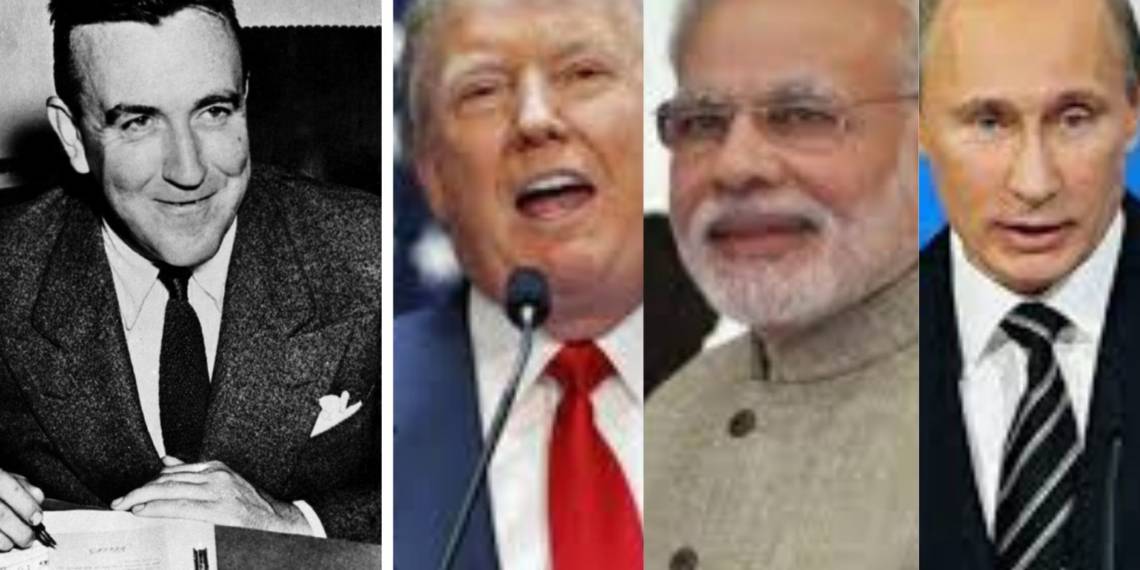Western opinion-makers today envisage a triangular world with Russia, China and the US being the main competitors. They tend to put Russia and China in an informal strategic axis. But few realise that the Sino-Russian strategic partnership is just as fragile as the melting Polar ice in the Arctic.
Russia cooperates with China because the West had cut it off after the Crimea annexation in 2014. Now, Putin cooperates with China in areas of interest and reluctantly eschews deep conflicts in the Sino-Russian relationship.
However, 56 years ago, a visionary American diplomat, Chester Bowles- the Ambassador to India from 1963 to 1969 had predicted the fault-lines between the erstwhile Soviet Union and the People’s Republic of China. He was far-sighted in his perception of the threats that Chinese expansionism posed to the world peace and the Washington-led rules-based international order. Bowles had also realised New Delhi’s pivotal role in 1964 itself.
Interestingly, the then US Ambassador to India had told Triloki Nath Kaul, India’s then Ambassador to Moscow, “it would be a good thing if India could try to bring the Soviet and American points of view closer… India’s friendship with both could act as a sort of bridge between them.”
What Bowles added was even more prophetic. He “hoped that it would be possible for [the] USA and USSR, with the help of India, to come to some kind of understanding about preventing Chinese expansionism and infiltration in South East Asia.”
Indian diplomats seem to have been aware of this geostrategic point of view. It is also not lost on us that the memories of the 1962 Sino-India war and the Chinese betrayal were still fresh in the Indian psyche. Then US President John F Kennedy had himself come to New Delhi’s rescue during the war.
The American diplomat who was stationed in India just after the war ended would have been able to gauge the threat that Chinese expansionism and Beijing’s salami-slicing tactics posed. Moreover, the US was still considering which country to choose between India and Pakistan to gain more presence in the region.
Kaul had himself replied to Chester, “India would be glad to bring the U.S. and Soviet points of view closer as far as lay within our ability. In fact, this was our present policy.” It would have been a major diplomatic exploit for India to bring the erstwhile USSR and the United States on a path of reconciliation and strategic understanding, as it would have isolated China.
This couldn’t happen partly because of the non-alignment brand of diplomacy in the Nehruvian era that bordered on passivism, and partly because limiting the USSR figured more prominently on the American mind. By the late 1960s, there was a Sino-Soviet spat which opened up options for the democratic world.
But the acrimony in the Communist world was perceived differently by the US. Western policymakers rejoiced at the idea of isolating Moscow, even if it meant pulling Beijing into their orbit. As China was able to ensure rapprochement with the Western world, India had to forgo the opportunity of facilitating the exploration of common ground between the US and the USSR.
Nonetheless what Chester Bowles had said in 1964 is all the more relevant today. The USSR was the bigger of giants in 1964, and thus pulling China into its orbit was acceptable to the American policymakers. But today, China is the bigger and more dangerous of Red powers if we compare between Moscow and Beijing. Russia is easier and safer to negotiate with than China.
Consequently, the American opinion was hostile towards the USSR during the Cold War-era but it is becoming more and more critical of China in the Trump era.
India itself is better poised to ensure a common understanding between Washington and Moscow in 2020 as compared to 1964. Indo-US relations have been improving over the past two decades as Washington gets more and more disillusioned with Pakistan and China.
With PM Modi at the helm of affairs, Indo-US ties are peaking. India is a lot closer to the “Washington Consensus” than it was in 1964 and the US too values India’s friendship. At the same time, India hasn’t left Russia behind.
By purchasing the S-400 Triumf, arguably the best air defence system from Russia apart from several other defence equipments, New Delhi has been making it clear that it is not ready to give up its friendship with Moscow. India’s military purchases from Moscow continue unabated despite American and European sanctions.
During the Eastern Ladakh military stand-off between India and China, New Delhi made emergency purchases from all its defence partners, including Russia.
Ultimately, better ties with New Delhi is the best PR that Russia can afford in contemporary geopolitics. India is the only country which can rescue the sanctions-hit Russian economy, as Western policymakers will have to realise that crippling Russia with sanctions only pushes it closer to Beijing and makes China even more powerful.
Washington and Moscow don’t have to be best friends, but there has to be a strategic understanding avoiding American sanctions that create a weak Russia. A weak Russia feels compelled to engage with China, while a more self-dependent Russia can be drawn away from China. What a far-sighted American diplomat predicted in 1964 is unravelling in the Indo-Pacific of 2020.








